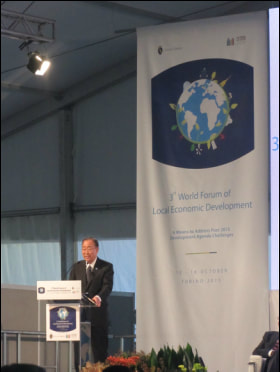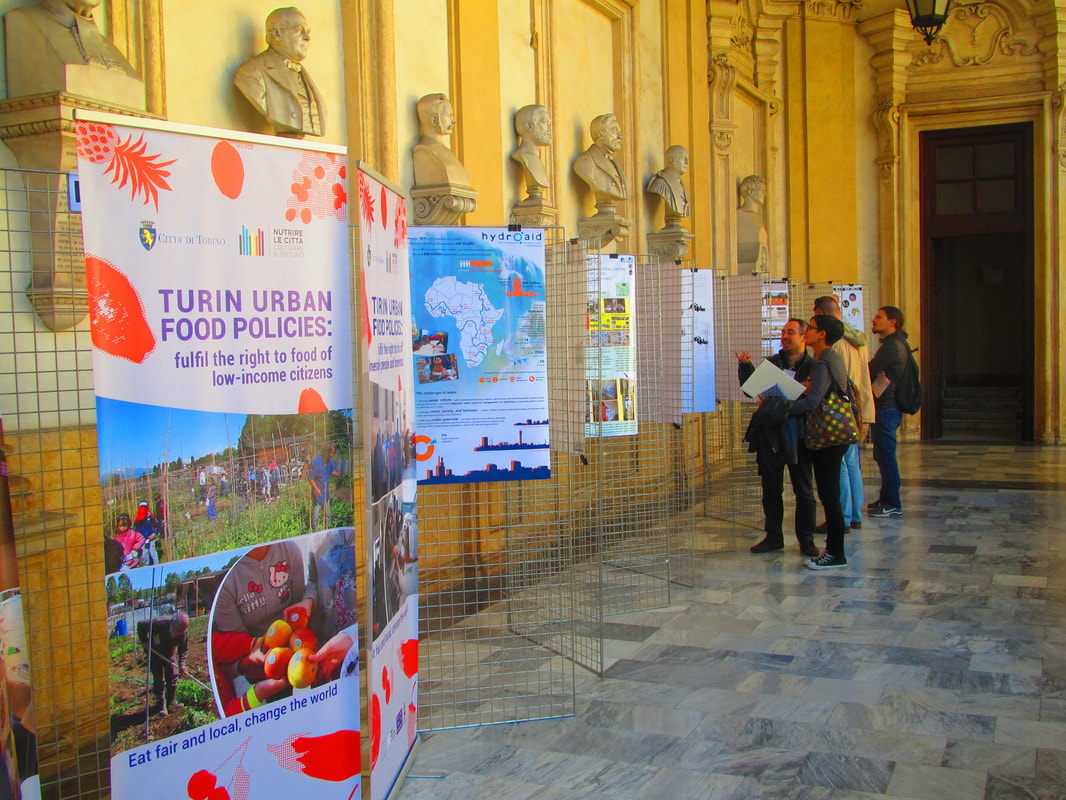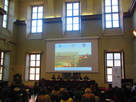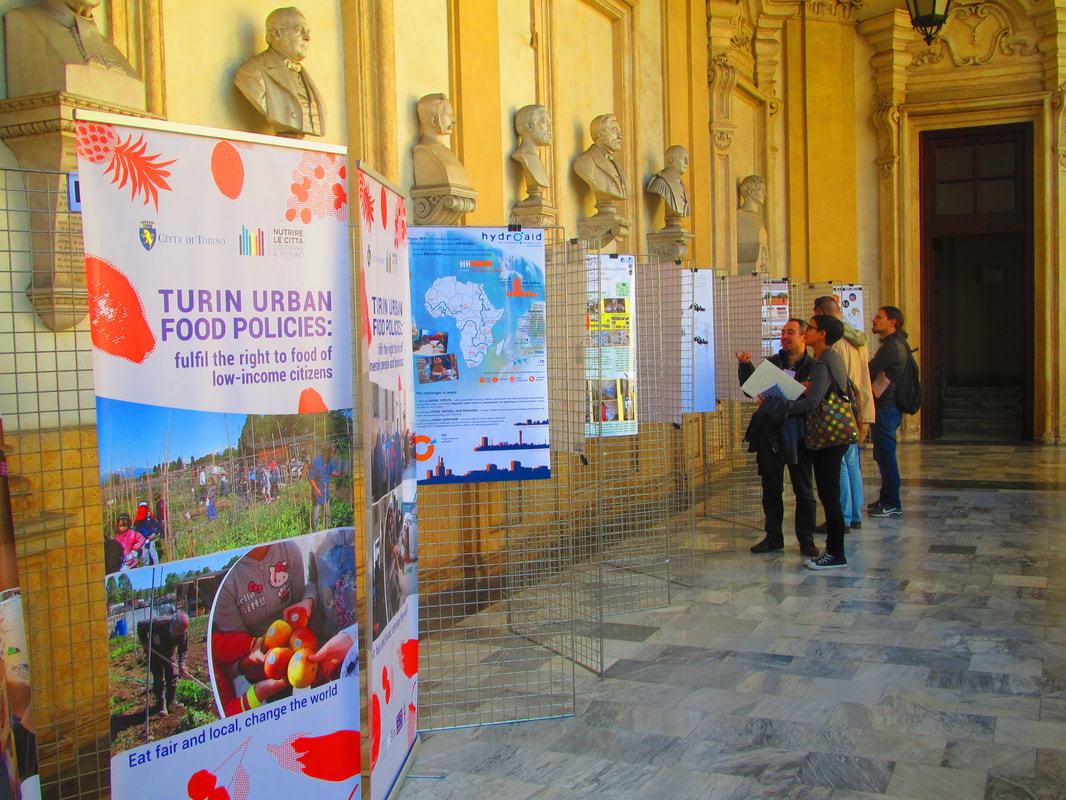|
"Development is a local challenge that must be faced globally". This is how Ban Ki-moon, the Secretary-General of the United Nations summarized the meaning of the 3rd World Forum of Local Economic Development hosted by the City of Turin from 13th to 16th October 2015. In a context where "cities are merging and distances are getting shorter", most people still live within a 500 km radius for their entire life and struggle everyday for survival. This is why, insisted Ban, the local dimension remains of critical importance and future efforts must be driven by the goal of producing a greater enclosure rather than dispersion, thus retaining regional and global stability. In an open invitation to an audience of over 1,000 delegates from all over the world, the UN Secretary-General encouraged local authorities to reach out for their citizens and asked local communities to support their administrations for engaging in development processes, particularly in urban transformations. As remarked by the Mayor of Turin, Piero Fassino, the III LED Forum took place on a roadmap of events marking 2015 as a milestone year for development: the negotiation of the new Sustainable Development Goals (SDGs) recently approved in New York, the conclusion of EXPO Milano 2015, Habitat III - the United Nations Conference on Human Settlements and Sustainable Urban Development scheduled for October 2016 - and the COP21 climate conference in Paris in 2015. Although local economy and development are the hot topics crossing these great international events, people are their true focus. People as individuals, members of communities and the ultimate stakeholders in the changes, are the source of innovations and, as the President of the Piedmont Region Sergio Chiamparino stated, "innovations are the only means to overcome the contradictions and discriminations originated by economic growth". The needs and sensitivities of local beneficiaries will therefore represent the pillars of an effective approach to development. According to Minister of Foreign Affairs Paolo Gentiloni, the role of small communities, schools and women is essential for stimulating the economy. Drawing from the experience of large cities so far, the Italian Senate President Pietro Grasso pointed at flexible models of cooperation that can foster inclusive development based on new public-private partnerships and modular solutions. And if on one side Turin was hosting the III LED Forum, on the other it was also the chosen location for the international conference “Urban Africa” organized from 16th to 18th October by Center for African Studies (CSA) of Piedmont and the African Studies Association in Italy (ASAI) in collaboration with the Department of Culture, Politics and Society, the Department of Law at the University of Turin and the Department of Architecture and Design at the Politecnico di Torino. In his keynote speech, Bill Freund from the University of KwaZulu-Natal (Pietermaritzburg, South Africa) spoke at length about the new scenarios faced by cities in Africa, where even the common definition of cities is changing. “Urbanism”, he said, “appears irreversible as almost nobody is willing to return to rural origins The people imaginary of ideal city, an ever changing concept, is being transformed to its very essence by new economic and social trends. Whatever the results of these processes will be, however, the impacts of growing cities on their surrounding areas (in terms of sustainability, food production and population welfare) should be a matter of preventive planning.
African urbanization, according to the accurate interpretation of anthropologist Maria Anita Palumbo, can be an incentive to "reverse the point of view" over the idea of cities. What can we learn from “Urban Africa” about our urban condition? We learn that cities are nothing else than bodies and goods, shaping the architecture, the behaviors and the objects composing the structure of our urban centers. One of the most compelling issues emerged during the conference was the relationship between cities and markets: the colors, crowds and motion of markets make them and their 'unplanned spatiality' a core landmark in the African continent, from large cities to the semi-arid Sahel region. These are the aspects that describe better than anything else the evolving spirit of the urban context spirit. Africa is moving from the periphery to the center of urban agglomerates, along the river banks or the river themselves, over barges full goods to be sold or exchanged. The African cities described as "instant cities" by Dr. Palumbo are nothing but photographs of a reality that will never be the same again. An apparently chaotic perception of urban spaces, this vision is an actual ability of restructuring the living environment, a real process of city creation. On the other hand, Liana Ricci, researcher from "La Sapienza" University of Rome, aims to "reconfigure the city and orientate it towards a path of resilience". The ability of ecosystems to respond to stress or shocks, thus becomes the benchmark for adapting new infrastructures to changing environmental conditions. Water demand in particular emerges as a binding parameter that will guide architecture and infrastructure design, with the goal of reducing social inequalities in the access to basic services, reinforcing resilience and expanding the involvement of local actors. The focus rising from these two occasions – the III LED Forum and the conference “Urban Africa” – dedicated to dialogue on development points straight at the priorities which will have to be addressed by the 2030 Agenda: people, protagonists of rapidly changing scenarios. Economic development starts from the individuals living and defining cities: they are not only the ultimate stakeholders of development policies, but also the necessary active subjects generating them and, through the expression of their identities, in charge of those resilience strategies that will shape their future.
1 Comment
|
Archives
April 2024
Categories |
Location
|
Contact Us
|





 RSS Feed
RSS Feed